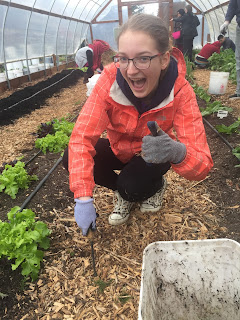Service Learning- Edmonds Farm
I did my service learning at the
campus community farm, Monday, April 8th, it was a two-hour work party and my
supervisor was Gwen. The campus community farm is managed by Farmer Frog, which
is a nonprofit organization that supports urban farming and garden education.
The goal of this event is to learn about gardening skills, sustainability, food
issues, and nutrition. At this even I helped weed in the hoop house, planted
some new vegetables in the hoop house like carrots and rutabaga, and planted
some lettuce outside.
It was
interesting to learn more about the applications of science in society, it was
cool to see how things like urban farming have an impact on our environment.
It’s also amazing that in just a few hours of volunteering you can make an impact
on our community. Farms like these can have a big impact on our environment.
This farm provides a sustainable, organic place to get food that is near our
homes, which means that is less distance that the produce need to travel to
reach their consumer, which has an impact on global warming, and helps to
lessen ocean acidification. They also provide a permeable surface in a non-permeable
environment. If you didn’t know the community garden is right by the parking
lot which is a non-permeable surface, and the garden provides a place for water
to re-enter the ground water supply, and help our plants grow. By providing a
place for the water to go, the farm helps our marine environment because as the
water were to make its way to the ocean, or wetland it could pick up pollutants
along its way. This was an interesting service learning project because at
first it may seem as though a small garden would have no relation to marine
biology, but it does have a positive impact on the environment. It’s amazing
how things we don’t think will have an impact on our oceans do make a difference,
so I’m happy I got the opportunity to participate in an event like this.
Some questions that arose from this service learning:
1.
How many small farms like this exist in our area?
2.
How much food does that garden produce each year?
3.
How many people work at the farm throughout the
year?
4.
Do other colleges have farms or areas like this?



Hello Holly! I also wanted to do this service learning, but I chose instead the monitoring of water's quality. Learning about how to grow vegetables is a very interesting thing. I suppose the planting you worked in is purely organic, right?
ReplyDeleteDid you get to keep some of the food? I heard others did. Honestly the horticulture classes at the school are really fun!
ReplyDelete